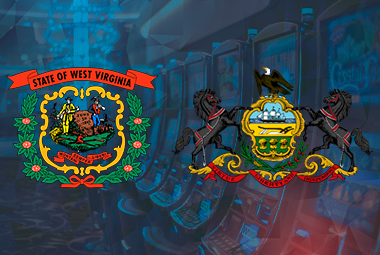Introduction
The first thing that we want to do is, for the purposes of this article, come up with a definition for, “Convenience Gambling.”

CONVENIENCE GAMBLING---Giving the people of a particular state or jurisdiction access to as many means by which to gamble, and locations in which to gamble, as meaningfully possible.
Of course, online gambling is the ultimate form of convenience gambling--in a sense. In terms of location, online gambling can take place wherever you happen to be. When looked at in the case of individual online casinos licensed and regulated by those states which have chosen to do that---you can gamble anywhere within the state’s boundaries from your device.
Naturally, many people find that the experience of playing a physical slot machine differs greatly from playing the representation of a slot machine from your phone, tablet or computer. I guess that’s true, though it warrants consideration that the returns-to-player are much higher on most of these sites, which is to say that the house edge is a lot lower.
We will ignore online casinos for now and focus instead on convenience gambling as relates physical locations to play machines.
West Virginia represents convenience gambling in its final form. If you want to go to a tobacco shop, then you’ll probably find some machines there. If you want to go to a bar, then there are almost always going to be a limited number of slot machines (5-7 units) that are authorized by the state’s Limited Video Lottery. If you visit a restaurant that is open to all ages, about 10% of the time there will be a separate room with limited video lottery terminals.
It honestly doesn’t take much to entice players to these places. All of them (except the actual casinos) are forbidden from offering free alcoholic beverages. MOst of them don’t even sell alcoholic beverages aside from cheap beers. These places are forbidden from offering cash back, a players club system, or any comps aside from:
- Free coffee.
- Free soda/pop.
- Free bottled water.
- Free snacks and appetizers.
And...that’s it. The snacks are better at some locations than others, with a small number of locations not offering any snacks at all. For the majority of locations that do offer snacks, it’s usually mini candy bars, small bags of chips or pretzels and/or Little Debbie snack cake type things.
Honestly, it works. The players come and pound the button on their slot or keno (sometimes, but rarely, video poker) game of choice and often lose as much, or more, as they would in the casinos. Similarly to the casinos, the State of West Virginia gets a percentage of all of the gross proceeds.

Pennsylvania v. West Virginia
I have always advocated that states should adopt the West Virginia model of doing things, at least, if they are as concerned about state revenues as they claim to be. Additionally, these slot parlors do not run themselves, so it can fairly be said that some jobs and new businesses are created by way of the existence of these machines.
Pennsylvania Square Land Miles: 44,820
West Virginia Square Land Miles: 24,087
Pennsylvania Population: 12,783,254
West Virginia Population: 1,784,787
It’s obvious that, with Pennsylvania, you have a state that has nearly double the land area of West Virginia and more than seven times the population. Let’s take a look at the number of casinos in each state:
Pennsylvania: 14 (13 During FY 2018-2019)
West Virginia: 5
Okay, all of that makes sense given the disparity in land area and population. Of course, Pennsylvania’s casinos tend to be centered around bigger cities with three (now four) in what could be considered the Pittsburgh market as well as at least five that could be considered Philadelphia market.
With that, let’s take a look at the total number of gambling locations for machines during the fiscal year:
Pennsylvania: 13
West Virginia: 1,235
Wait...what?
That’s right! West Virginia was home to 1,230 Limited Video Lottery locations during that fiscal year. For those of you inclined to do the math, that’s one gambling establishment (not counting traditional lottery sales) for every 1,445 residents of the state. It’s even fewer residents than that if someone wants to do the work to disinclude those who are under 21 and can’t gamble anyway.
West Virginia’s five casinos were home to a total of 5,607 electronic gambling devices compared to 6,460 Limited Video Lottery devices for a total of 12,067 electronic gambling devices in the state. That’s a gambling machine for every 148 residents of the state! It’s even closer to one in 100 if you don’t count those under 21.
Should we consider this a positive development overall? You know what? That question is above my pay grade, so I’m going to let someone else handle it. The one thing that I will say is that I’ve not heard of anyone putting a gun to anybody else’s head and forcing them into a parlor to gamble, so whatever monies are lost (and percentage of state revenues derived) to the casinos and parlors represent a tax on the willing.
It’s like a parlor owner once told me, “I only need to win two paychecks a week.”
The parlors also represent a form of gambling that many people prefer to casinos. They are limited to up to seven machines for public-facing locations and to ten machines for private clubs and fraternal organizations (all you need do is sign a guestbook, in most cases) so they tend to be quiet.
The parlors also have to compete in a different way than do casinos. Where casinos are designed to be exciting and loud, parlors often have a goal of being as comfortable as possible. Instead of the cheap swivel chairs that are often found in casinos, parlors will often have cheap (but roomy and comfortable) office-type chairs. There’s usually plenty of space between machines simply by virtue of the fact that there aren’t many machines...it doesn’t take a big room.
Another thing being indirectly advertised is a sense of camaraderie with the people who work at the establishment. You won’t have to visit many parlors to realize that several of the people who visit a particular one are, “Regulars,” who come like clockwork and generally stay until they lose whatever they brought with them that they didn’t mind losing.
Simply put, these places appeal to a certain subset of gamblers that the casinos do not, though there is often some crossover between the two groups. It’s kind of like how some Vegas locals would rather go to a small bar or something like a Dotty’s as opposed to one of the full-scale casinos.
Why Not Pennsylvania?
Why would Pennsylvania not offer these sorts of places? The closest thing that they have come to stepping in the right direction (if you care about revenue) is that they have authorized limited licenses for some truck stops that meet certain criteria. Additionally, the state (or, more to the point, local jurisdictions) do not seem terribly concerned with the, “Pennsylvania Games of Skill,” despite the fact that the state doesn’t actually make any money off of those.
We’re not getting into right or wrong, but I will say that the bars and restaurants spent a significant portion of 2020 completely closed, at Governor Wolf’s order, due to Covid-19. Even in December, usually the best month of the year for many restaurants (Christmas shoppers) Governor Wolf again put the kibosh on indoor dining.
In fact, I’d ordered pick up from a local establishment and noticed that there were people dining and drinking inside. When I asked the manager if she was worried about the potential for fines and temporary closure, she responded, “If we don’t have this month, we’re done anyway, so it doesn’t matter if they fine us.”
I tend to believe her. Within just the last year, I’ve seen now four restaurants (two of them bar/restaurants) and one place that was only a bar close within a mile of where I live.
Taking quick action to get some gambling revenues into these places might give those that remain a chance to bolster back up their financials to enable them to get back where they were prior to Covid-19. More than that, it will also enable the state to pull in a piece of that sweet limited video lottery action for itself.
That doesn’t even mean that they have to go full-scale with it like West Virginia does. As crazy as it might seem to those who have never been to the area, some places literally exist and serve no real function aside from selling $1 beers, giving away pop, coffee and snacks and having five machines in the establishment. That’s the only thing they have to do to be profitable.
Instead, Pennsylvania could do something like limit it to places that operate as bars and for whom a substantial percentage of their revenues come from the sale of alcohol. You could make it bars and restaurants. But, if you really want to make bank, just do it the way West Virginia does.

By the Numbers
Let’s take a look at the numbers.
Pennsylvania’s Fiscal Year for casino reporting ends on the last day of June, which makes the 2019-2020 FY particularly hellish because casinos were completely closed for two months. We’re going to skip straight to the state’s take on slot machines for one year compared to the other:
FY 2018-2019: $808,812,176.49
FY 2019-2020: $577,304,899.24
Ouch, that hurts. They’re going to feel that 28%+ drop come budget time.
In the meantime, let’s take a look at the same numbers for West Virginia for casino slots as well as Limited Video Lottery machines--keep in mind that these are the revenues that go directly to the state:
West Virginia Casino Slots 2019: $230,032,000
West Virginia Casino Slots 2020: $169,165,000
We see that state revenues are down nearly 26.5%, but let’s now take a look at the revenues the state took in from Limited Video Lottery:
West Virginia Limited Video Lottery 2019: $184,552,000
West Virginia Limited Video Lottery 2020: $155,158,000
Interestingly, those numbers are AFTER West Virginia made their distributions to counties and municipalities. In total, we see that these revenues decreased by only about 15.9%.
In total, the State of West Virginia (after disbursements) saw $324,323,000 in direct state revenues on all electronic gaming revenue inclusive to limited video lottery and machines physically located in the casinos. Let’s take a look at how that pans out, per resident, for 2020 compared to Pennsylvania:
Pennsylvania: 577,304,899/12,783,254 = $45.16/resident
West Virginia: 324,323,000/1,784,787 = $181.72/resident
Of course, neither state did well compared to the numbers for the previous year, but it looks like the State of West Virginia will have a little bit less of a shortfall compared to expected to worry about having to cover.

Not Just the Pandemic
I’m not just crapping on Pennsylvania because of the pandemic and accompanying shutdown of casinos...they shut down just about everything else in March and April, as well. Anyway, that’s all beside the point.
The fact of the matter is that a new parlor can open in West Virginia as soon as the state can get the location licensed and get the machines out to them.
Whether they like it or not, the casinos and the parlors are assets to the states and should be treated as such. Any good investor will tell you that you have to diversify your assets and the parlor model accomplishes exactly that.
Imagine for a second that a small or medium-sized town (not city) lands some big construction project on a warehouse, or something along those lines. That’s going to result in workers in and out of that local area for a year as well as people moving to the area for the permanent jobs that will soon be there.
Would such a thing justify a full-scale casino in town?
Probably not. What you could do, though, is you could have any number of parlors in that town operational within a month. Easily. Like I said, they can go up as fast as the state will license them and they will go wherever it makes economic sense to do so.
Unlike the casinos, it’s also not going to be a massive economic hit to the area if there is slight oversaturation in the market and one or two parlors shut down. You’re only talking about the loss of maybe 5-10 jobs per location. Not the end of the world. If worse comes to worse and a casino is forced to shutter, not only do you have a physical property that’s going to be difficult to repurpose, and probably even more difficult to sell, but you have the loss of hundreds of jobs.
That’s not to say that there shouldn’t BE casinos; casinos should exist wherever they can operate profitably. That’s just to say that there SHOULD BE parlors. Parlors are more dynamic, easier to build, easier to open, easier to operate and don’t leave a huge empty footprint in the event that they (individually speaking) close.
Can parlors be repurposed when they close? Of course! Many of the locations ARE repurposed locations. While it’s true that some of them are built from the ground up, let me give some examples of buildings that turned into parlors:
- A restaurant that had been closed for years sub-divided and turned into two parlors.
- A few houses were instead rezoned as commercial property and turned into parlors.
- Failed bars ceased operating as traditional bars and repurposed themselves as parlors.
- A few failed restaurants transformed into parlors.
Most of the new parlors that were built could easily become storage or office buildings if they were to close, but that’s unlikely to happen, because the vast majority of these locations, as mentioned, don’t need many regular visitors to at least break even. Another thing that we’ve already covered is that existing bars simply put machines along one wall whilst some existing restaurants created a separate video lottery room.
The whole entire concept is the ultimate in diversification. Again, nobody saw the pandemic coming. However, what can be seen coming is gradual economic declines in a specific area. When this happens, parlors would close one by one and the number of parlors available will generally be, “Right-sized,” for the market. It’s not like you can just close a full-scale casino one day...they have to wait it out and see if things turnaround so substantial is the investment.
The concept of parlors, as mentioned, is perfect for when an area receives an economic boost from some unrelated location, even on the microlevel of a small village. This town of 1,200 people used to have two parlors, but now it has three...that sort of thing.
People are also going to feel more comfortable in parlors after this pandemic. In the case of many of them, you’re already socially distanced without even really having the need to do anything, though many parlors have put partitions (plexiglass) between the machines anyway. The parlors, believe it or not, also tend to be cleaned more frequently because you have one person whose only job is to take care of anywhere from 5-7 players and the machines.
The other thing is that parlors are also safer for the players, to a certain extent, than casinos. For one thing, most parlor operators aren’t going to let a person get ridiculously drunk and some even limit the number of beers they’ll even sell you in one day. Casinos aren’t going to cut you off (generally speaking) unless you actually start becoming a disturbance to other people.
Honestly, it makes sense on every level. It makes the most sense on the level of state revenues because you make gambling easily accessible to as many people as theoretically possible.
Problematic Aspect
The only problematic aspect is, perhaps, making gambling more widely available to problem gamblers. I would like to address this issue by pointing out a few things:

- If the states really cared, then they probably wouldn’t have legal gambling at all.
- If the states cared at all, they wouldn’t have lotteries with games that sometimes return less than 50% of all monies bet to the player.
- Both states have online gambling, so gambling is theoretically available anywhere that you happen to be.
- States and casinos will give problem gambling lip-service, and much like with online gambling, there are self-exclusionary methods available to those who think they may have a problem.
Overall, I have to conclude that Pennsylvania doesn’t care that much or they wouldn’t be doing what they’re already doing.
CONCLUSION
It makes sense for every state that cares about revenues, really, but especially makes sense for the State of Pennsylvania to expand Limited Video Lottery to any location that wants it similarly to how it is done in West Virginia.
Going back to the point of repurposing unused buildings, after 2020, there should be no shortage of vacant commercial properties available for immediate occupancy. All we need is for the state to decide that something should go in them.


